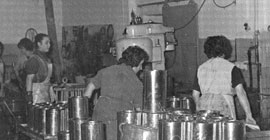 Fruit preservation has been and continues to be a fundamental concern in the food industry. Throughout history, humanity has developed various methods to prevent fruit from rotting and wasting, and many of them are still used today. Today, thanks to the technological and scientific advances available, we have modern fruit preservation methods that extend the shelf life of fruits without compromising their nutritional quality and flavor. Let’s see these methods and their importance in the preserved fruits industry.
Fruit preservation has been and continues to be a fundamental concern in the food industry. Throughout history, humanity has developed various methods to prevent fruit from rotting and wasting, and many of them are still used today. Today, thanks to the technological and scientific advances available, we have modern fruit preservation methods that extend the shelf life of fruits without compromising their nutritional quality and flavor. Let’s see these methods and their importance in the preserved fruits industry.

Why is fruit preservation so important?
Fruit preservation plays a crucial role in food security, not only to reduce food waste but also for the availability of fresh produce all year round. In addition, it allows canned fruit manufacturers to diversify their offering and reach new markets. However, effective conservation requires an understanding of the conservation methods available and how they work. Let’s see them:
Traditional fruit preservation methods
Let’s remember the traditional methods that humanity has used for centuries to preserve fruit and that, in some way, continue to be used today:
Fruit drying
Drying is one of the oldest methods of preserving fruits. It consists of removing moisture from the fruit, which prevents the growth of microorganisms. Some examples of fruits in which this preservation method is still used may be figs or raisins.
Syrup
Preserving fruits in syrup involves submerging the fruit in a solution of sugar and water. Sugar acts as a preservative by elevating the osmotic pressure in the water, thus inhibiting the proliferation of bacteria via dehydration of its cells. Some fruits that are usually preserved in syrup are cherries, apples, oranges, kiwi, strawberries, blackberries, etc.
Canned
Canning is a preservation method that involves cooking fruit and sealing it in airtight cans. Sterilization during the canning process eliminates microorganisms and allows for long-term storage.
Modern fruit preservation methods
Although traditional methods remain effective, technological advances have given rise to modern preservation methods that are more efficient and preserve better the quality of the fruit. These are the most important:
Refrigeration and freezing
Refrigeration and freezing are the most common preservation methods today. These methods reduce the temperature of the fruit, slowing microbial activity and enzymatic degradation. This keeps the fruit fresher for longer and preserves its flavor and texture.
Modified atmosphere
The modified atmosphere involves the control of the composition of gases that surround the stored fruit. Reducing oxygen and increasing carbon dioxide slows ripening and prolongs the shelf life of the fruit. This method is widely used by canned fruit manufacturers.
Freeze drying
Freeze drying is a process that involves freezing the fruit and then removing the water by vacuum sublimation. This method preserves the shape, color and flavor of the fruit, making it ideal for the production of freeze-dried fruits.
Irradiation
Irradiation is a preservation method that uses ion radiation to eliminate microorganisms and delay fruit ripening. Although controversial in some places due to food safety concerns, it is used in several countries for fruit preservation.
Modern canning
Although canning is a traditional method of preservation, modern technology has significantly improved this process. Canned fruit companies use highly sophisticated equipment and innovative canning methods that ensure the quality and safety of their products, with precise control of temperature and pressure during the can filling and sealing process.
Innovative packaging
Modern packaging used in canned fruit is more resistant and effective in preventing the entry of oxygen and light, which helps maintain the quality of the products for longer.
What benefits do modern fruit preservation methods provide?
The use of modern preservation methods offers several advantages to both manufacturers and consumers:
- Fruit availability throughout the year: Modern preservation allows companies to offer a wide variety of canned fruits at any time of the year, satisfying the demand of professionals and consumers at any time.
- Reducing food waste: Efficient fruit preservation prevents food waste by prolonging its shelf life. This is very important to address the global problem of food waste.
- Conservation of nutrients and flavor: Modern preservation methods allow the nutrients and flavor of fruits to be better retained, offering healthier and tastier products.
- Greater comfort: Canned and freeze-dried products are easy to store and transport, providing convenience to businesses and professionals alike.
Why trust preserved fruit manufacturers established in the market?
As the canned fruit industry adopts modern preservation methods, maintaining high food safety standards is essential. Handling and processing of fruits must be carried out under strict hygienic conditions to prevent contamination and ensure product safety.
Hence the importance of trusting brands with a long history in the market and extensive experience in all types of canned fruits, as is the case of Lazaya Preserved Fruits, with more than 80 years manufacturing the best canned fruit.
At Lazaya we use modern fruit preservation methods and a wide catalog of fruits for professionals with different formats and packaging to adapt to their needs. Do not hesitate to contact us if you have any questions or queries. We want to help you differentiate yourself from the competition.










